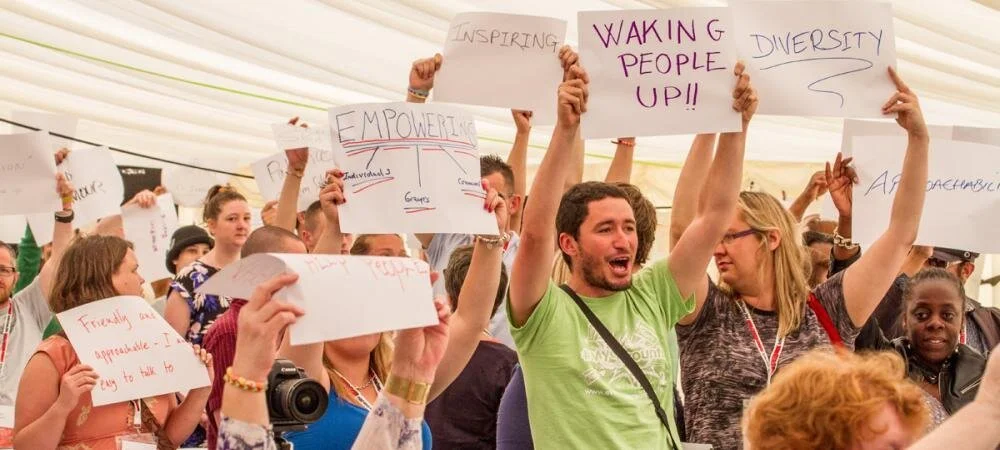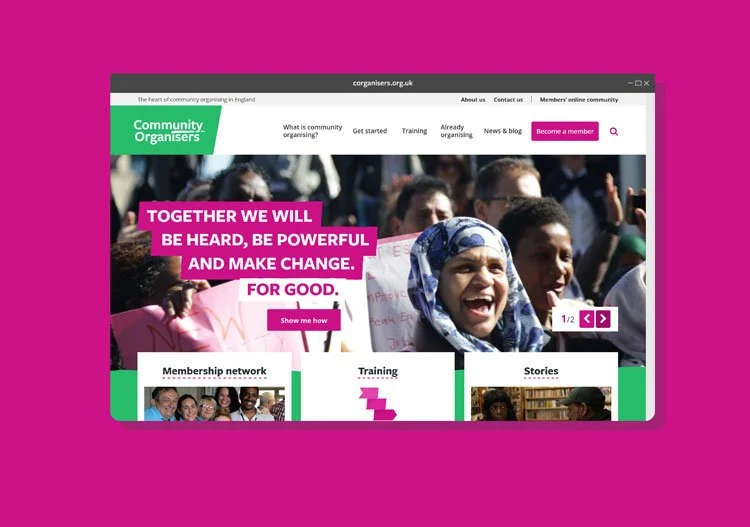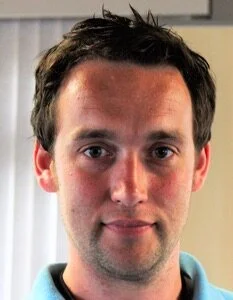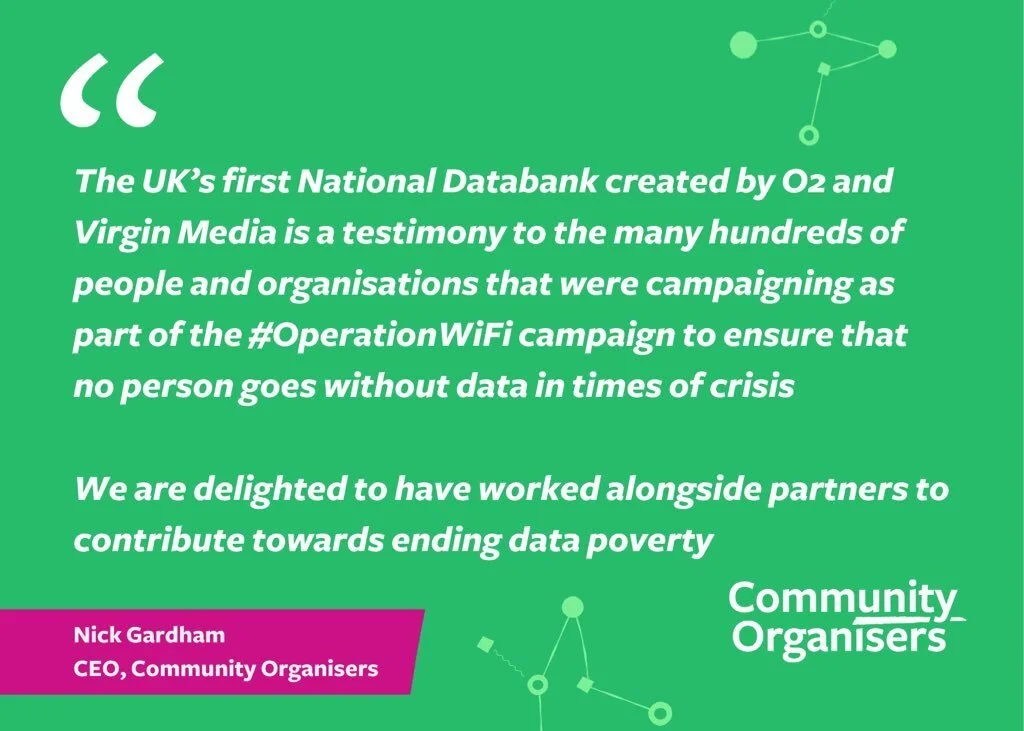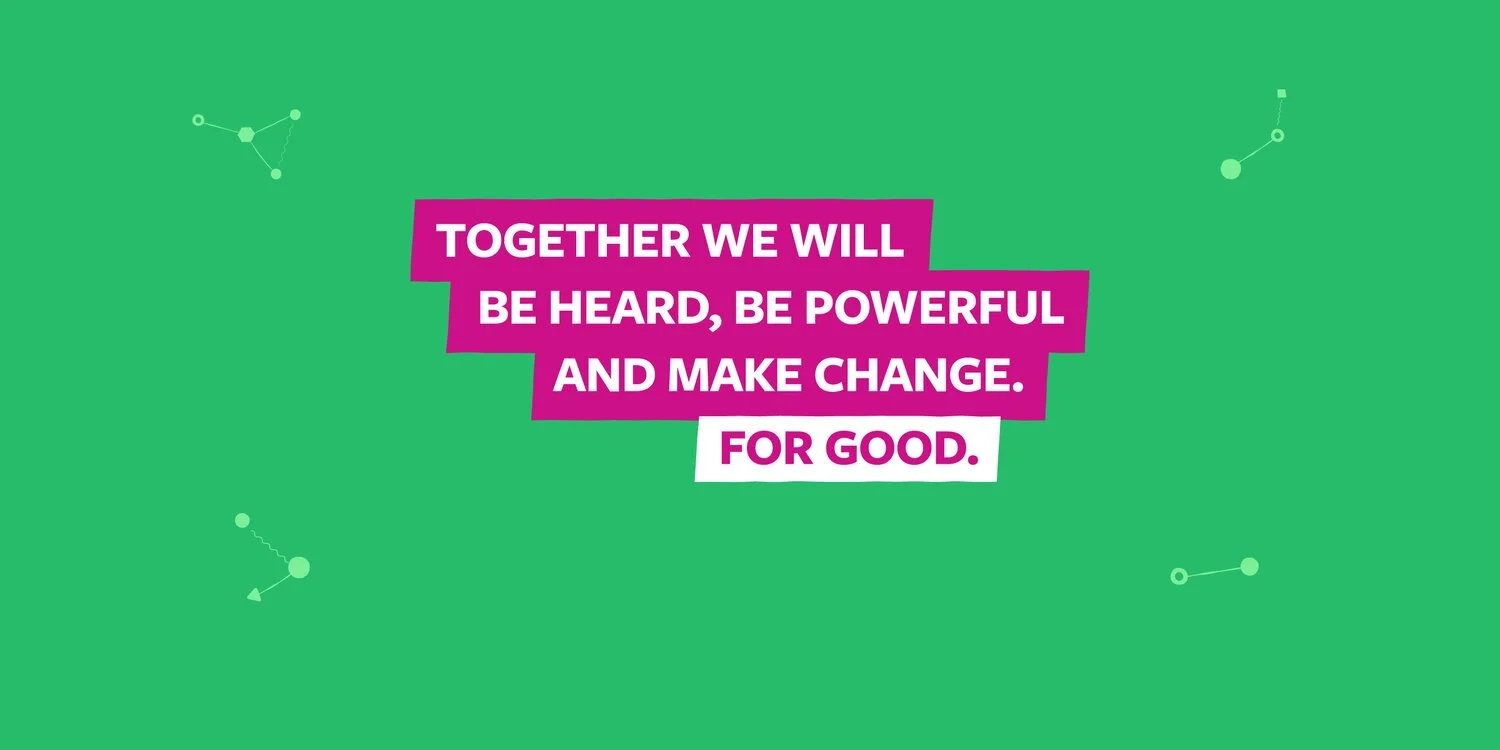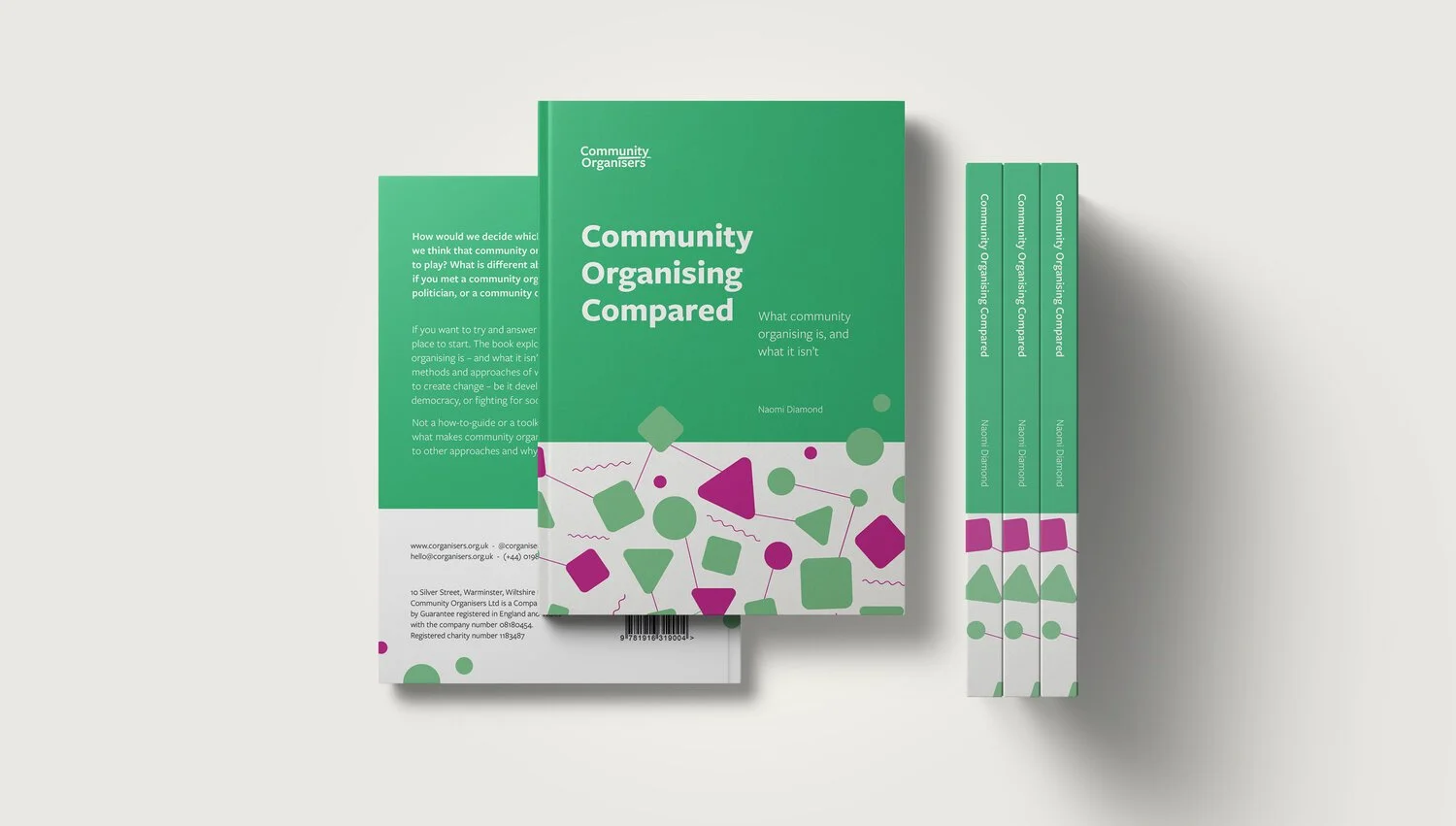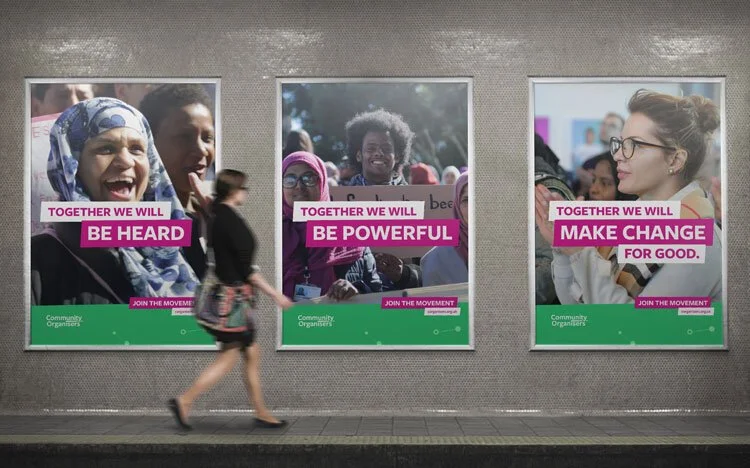How the community organising movement in the UK found its voice
Community Organisers is an amazing organisation, doing valuable work across the country. They are skilled communicators, using an inspiring central message and beautifully crafted, valuable content to build relationships and make change happen. This is a useful case study if you have ideas to share at the heart of what you do, and want to learn how to get the word out widely and your message to connect.
How do you get an important idea to land?
Some ideas are so important, they just have to get out there. Community organising is one such concept. This is the work of bringing people together to take action around their common concerns and overcome social injustice. Community organisers reach out and listen, connect and motivate people to build their collective power. When people are organised in this way, communities get heard and power begins to shift, leading to real, positive change.
It’s a simple but nuanced approach, different from other, more direct and perhaps more well known forms of social action. How do you get concepts as important as this across?
A few years back, I was lucky enough to work with Community Organisers - the organisation responsible for the work of community organising here in the UK. CEO, Nick Gardham, recognised that their communication (their positioning and messaging, their website, the way they were marketing) was holding them back. It needed a complete overhaul.
Alongside brilliant ethical design and branding agency Yoke Design, I was invited to help out. I played a role at the start of the communication transformation - listening to Nick and the team, to their supporters and members, helping to reframe the Community Organisers message, website and content marketing approach.
Since that time, the team at Community Organisers have definitely foiund their voice. They’ve pushed their communications and marketing further than I could have ever imagined - a fabulous example of the valuable approach I recommend in action, for a movement with a clear and powerful voice.
Community Organisers get it right
I’ve watched in admiration over the last couple of years as their content and marketing efforts have gained strength, and am delighted to see the organisation fly as a result.
I love:
Their message. Simple, inclusive and motivating. The golden thread through all they communicate.
Their brand and visuals. Impactful, differentiating and consistently on point (nice one, Yoke!).
Their website. Inspiring, super-helpful and actionable, and simple to navigate too.
Their approach to social media and email. As you’d no doubt expect, a community feel to all this - with a focus on celebrating success, sharing resources, and forging connection.
The way they’ve embraced the digital opportunity, for training and membership engagement. Their webinars and online events are always well designed, super valuable, and very well attended.
The stories they tell. This is the favourite part of their whole content strategy for us, and the cornerstone of their marketing approach. These stories of the work of community organisers across the UK demonstrate what’s possible and the change that can be created. They’re compelling.
Their focus on continually listening to their network. Listening for stories, listening for questions to answer, listening for ideas to push the movement further. It shapes their approach to content and communications, and strengthens the relationships they need to thrive.
The lack of self-orientation across their communication. It’s all about their audience. A rare and perfect example of customer-focused messaging and outward-looking content that connects.
It’s all working. On the back of this approach, Community Organisers has an engaged and much expanded membership and network. They’re influencing at policy level in a way they could never have imagined a few years back. Community-led change is happening here in the UK, because of this vital work.
Their approach to communications with their members, supporters and network is just so good.
I wanted to unpick this approach for you in this article - a great case study to learn from if you have an important concept to share at the heart of your business. Plenty of ideas here to help you improve how you frame and talk about what you do, to achieve wide reach and impact.
Community Organisers’ brand and content journey
Nick Gardham, CEO, Community Organisers
I interviewed Community Organisers’ CEO, Nick Gardham to find out more about his approach to marketing and communication. Here’s what Nick had to say.
Please give us an overview of what you do, who you do it for and why it matters
Nick: I run Community Organisers. We set the organisation up to be the social glue between the thousands of people that were mobilised in local communities during a national government programme. Many people were left working tirelessly in communities and we were hearing they wanted to be part of something bigger – both for support and also for a sense of belonging.
Working in communities is tough work. Each day there are moments of happiness where you can see the outcomes of your efforts, but also there are valleys of despair. Working alongside people who often have very little economically means you see the challenges that everyday life presents and how the opportunities afforded to you and I aren’t always as readily available. Our work is trying to address this – it’s about trying to ensure that we can tackle the deep economic and social divides that exist between us and to ensure that we can build people’s collective power to work together to live a good life.
Your vision and goals for the future?
Nick: We are champions of civic participation. What that really means is we want to see people being active and taking part in their neighbourhoods to address the challenges that they are facing but also build on the positive aspects of community and neighbourhood life. As an organisation we want to be able to create the conditions for this – where all people regardless of their socio-economic status have a direct say and influence over their own lives and feel equally able to contribute.
As an organisation we want to be able to continue growing and reaching out to people who are active in neighbourhood and community life and be able to provide a supportive infrastructure so people can learn, share and act together.
One example of this at the moment is the #OperationWiFi campaign. 7 million people in the UK have no mobile or broadband connectivity at home. We campaigned for a national databank where unused mobile phone data can be gifted to those who need it in times of crisis. 100s of people and organisations got involved, and it’s worked! After catalysing the campaign in March 2020, last month the UK’s first National Databank was created by O2 and Virgin Media - a big step in working towards ending data poverty.
Tell us about the challenge of marketing Community Organisers
Nick: It’s hard to sell what we do directly because we aren’t actually providing a service or a product directly. We are with our training work – and people do contract us for that work, quite a lot of people actually - but the wider movement building work is an equally important part of what we do. And that’s the harder bit to sell.
We never used to be as confident about marketing ourselves as we are now. Confidence comes from not only having a great message but also a good set of visuals, and a clearer strategy. We invested heavily in all this (we were fortunate to be able to do so) and it has paid dividends.
What’s your approach? What content and communication works best for you?
Nick: Our approach is to have a very simple set of messages that we can repeat over and over. I heard recently that in the type of work we are doing it can take 15 years before we start to see any real change – so develop your message, hone it and then stick to it.
“Personal stories have the most impact.”
We share a variety of content. It is mostly images, quotes and stories from within our network. The personal stories have the most impact – a story of how an individual, or group, have worked through adversity and won through. This gives hope to others that they too can do it.
We have found that allyship is really important in sharing our messages – and directly asking people who support us to share it works better than being in the lap of the ‘algorithm gods’.
“Allyship is really important in sharing our messages.”
Most of our ‘big hitters’ on social media have come directly from listening to members of our network and then putting a message out there. Tapping into the ‘zeitgeist’ at a neighbourhood level and then amplifying that message really works for us. The #OperationWiFi campaign is an example of that, with the issue almost developing its own movement on Twitter.
“Most of our ‘big hitters’ have come directly from listening to members of our network.”
Offering free webinars and ‘bitesize’ content from our courses also works. It gets people interested and from that point we hope to keep people engaged. Whether they go on and purchase training from us is a separate thing.
For us the most important thing is building a movement and keeping it alive and interesting.
What results do you see from your efforts?
Nick: Our content tends to lead to a direct uplift in followers and reach, as you would expect, but we also see inbound training enquiries and sales of our book. It means we get approached to attend as guest speakers at various events, which helps to get the message out more widely.
Their book, a guide to community organising
I keep telling the team the more content we put out there, the more traffic we can drive to our work and the more people we can get interested and engaged. Not everything will attract hundreds of people – sometimes it will only attract 4 or 5 - but our work is relational and the exponential relationships that can be gained from these smaller sessions are invaluable.
As a result of this, the membership is building, the training is well attended and we’re building relationships with people in power who respect our work. It means we can influence and create lasting positive change in communities across the country.
How did you arrive at this level of clarity? Lightbulb moments? What or who has helped you along the way?
Nick: Sometimes you can be in something for so long that you lose the ability to communicate clearly about it. I think about 3 years ago we were heading into that time. We all care deeply and passionately about our work and all feel the same struggle as we endeavour to tackle the forms of injustice we see in neighbourhoods and communities.
We were fortunate to benefit from a large contract which gave us some income to be able to pay for a ‘rebrand’. It was this that really helped us develop the clarity of message that we now share. We were approached by a number of design agencies wanting to undertake the work but we were struck by a partnership between Yoke and Valuable Content.
Yoke were great – and we are indebted to them for all the work they did for us. For us, the really important bit of work that was undertaken was the listening work by Sonja and Sharon at Valuable Content. It was ‘invaluable’. The 1:1s with individuals to understand the organisation from their perspective was so important. It allowed the image and messaging to be built on the back of it. And to be honest, I am convinced that is why our brand is so strong in the eyes of our network. They can see themselves in it. It is their words, their images and their perceptions reflected back at them.
How do you make marketing work? Who does what? How do you keep up the content momentum?
Nick: To keep up momentum, we are constantly listening to our network for stories that we can share and then pushing them out there. It’s not always easy, and sometimes we can have some quiet weeks – particularly when we are all busy as we don’t have a dedicated ‘comms’ person, but we are hoping we can address that in the coming weeks ahead.
“We are constantly listening to our network for stories that we can share.”
Over the last 18 months we have really nailed the collaborative design platform, Canva. And slowly the whole team is learning how to use it. I spent much of the pandemic making resources and materials that were created by the Yoke Team and translating them into Canva. It means we can all do our bit quickly and easily, calling on Yoke for any more complex visual design needed.
What's changed for you during the Pandemic? How have you flexed your comms approach?
Nick: Like everyone else, things have gone online – but to be honest that didn’t really affect our comms approach. If anything we didn’t flex it. We just did more of it.
Our work is neighbourhood and community based – and as one of our network said, “we were waiting for something like this, we were made for it’. The networks and relationships that we have built were rapidly mobilised and supporting those in crisis. As a direct result we were capturing lots of stories, interest and the imagination of others. So we had lots of valuable content we could share.
We started to use webinars to promote our work. We used the wider socio-economic context to root the conversations and then linked it into our framework and approach for community organising. It was a real success. We have had hundreds of people sign up for webinars and over a thousand register for our annual event.
It was an opportune moment for Community Organisers. We just have to build on that success now.
What’s next? Plans, marketing challenges to overcome?
Nick: We want to be able to capture more stories from within our network so we are taking on some individuals from the Government’s Kickstart Programme. They will be employed to support us in proactively reaching out and listening to our members. They will hold 1:1s and capture the stories and issues from within our network.
We are on the search for that next big thing that is deeply felt and widely held.
The challenge with all of our work is securing the necessary investment to keep us going – and that requires us being able to ensure our messages are heard by the right people and that the value of what we do is recognised so that it can be invested in.
I have faith this will continue to happen for us. Our message and content is connecting. We’re in the right place.
Biggest lesson for other businesses from your experience?
Nick: If you want to develop a brand that is relevant and keeps relevant, listen. Listen to your supporters, members, customers, clients (the people who use your work) and ensure that it reflects who they are.
“If you want to develop a brand that is relevant and keeps relevant, listen.”
Be prepared to let go of your own preconceived ideas. Sometimes it’s very easy to have your own ideas of the message and stick with it. Don’t. Make sure ‘your’ message is ‘their’ message.
Also, include the views of your allies (and your competitors) if you have them. It’s really insightful to see how others perceive you. And be prepared for some shocks!
Key takeaways for your marketing & communications
Whether you’re a third sector membership organisation or a purpose-driven business, there are plenty of lessons from the Community Organisers approach:
Invest in listening to help you shape your brand message and your content approach. And keep listening, to evolve and refine your communication and service.
Stick to your message. As Nick says: “develop your message, hone it and then stick to it.” Repeat it over and over.
Divert your attention to your audience. Make your communication about them, not you.
Put time and effort into collecting and sharing their stories - from your network, your community, your client base. This is what will cut through. Personal stories work best of all (Read our post: Why success stories, not case studies, will fuel your marketing)
Enlist your allies to help you get the word out. Ask others for help to share your message and content.
Think big. Creating and sharing valuable content builds a community, and it increases other opportunities too. Create valuable content, share your ideas and it will take you to surprising places. The world is your oyster!
Be in it for the long haul. Keep sharing your ideas and their stories. Success will come.
Build a movement. Find your people and carry them with you.
A well earned Valuable Content Award
Congratulations to Nick and the team, and thank you - there’s so much to take from your approach. Community Organisers embodies the valuable ‘help, don’t sell; talk, don’t yell; show, don’t tell’ communications philosophy that I believe in perfectly.

